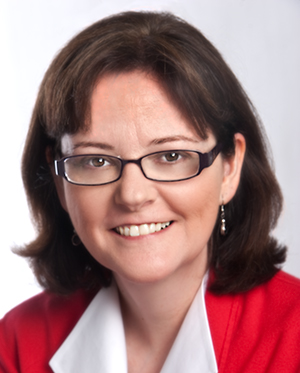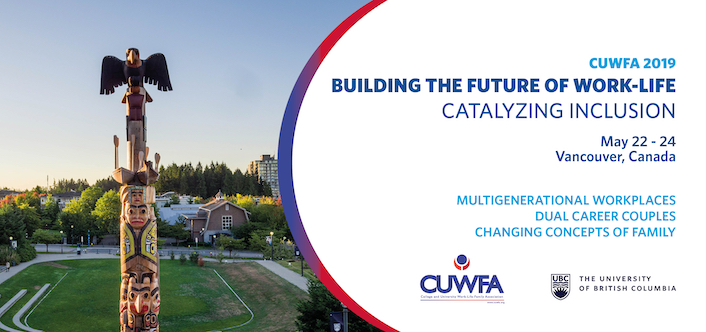|
|
| Rates |
|
| CUWFA Member | $525 |
| HERC/Partner Organziation |
$550 |
| Non-Member | $575 |
| Student/Retiree | $175 |
| One-day |
$350 |
| Sponsor |
$400 |
CUWFA Conference Scholarships
CUWFA offers a limited number of scholarships to cover the registration fee for the 2019 Conference. All current CUWFA members are eligible to apply. Scholarships will be awarded on a first come, first served basis. To apply, submit a written request to Sara Jane Finlay ([email protected]) no later than March 15, 2019.
Program Highlights
Conference Agenda
Keynote: Work and Family in 2020 and Beyond
Universities and colleges have been considering work and family for the past few decades. While some great programs exist, there is heightened expectations based on a renewed interest in employer-provided, employer-sponsored, and employer-supported initiatives that facilitates work-family harmony. What lies ahead? Based on over 30 years in the work/life field, Nora Spinks will share her insights and foresight with participants. She will link demographic trends and generational shifts that CUWFA members can leverage in their work to maximize impact.
 NORA SPINKS is CEO of the Vanier Institute of the Family. Throughout her career, Nora has worked with progressive organizations and business, labour, government and community leaders to strengthen families, create productive and supportive work environments, and build healthy communities. Building on her extensive experience in the work-life field, her unique perspective, critical analysis and strategic thinking, Nora provides information, insights and inspiration to individuals and organizations across Canada and around the world. She has shared her knowledge with the private, public and charitable sectors including in many academic (post-secondary) environments.
NORA SPINKS is CEO of the Vanier Institute of the Family. Throughout her career, Nora has worked with progressive organizations and business, labour, government and community leaders to strengthen families, create productive and supportive work environments, and build healthy communities. Building on her extensive experience in the work-life field, her unique perspective, critical analysis and strategic thinking, Nora provides information, insights and inspiration to individuals and organizations across Canada and around the world. She has shared her knowledge with the private, public and charitable sectors including in many academic (post-secondary) environments.
Panel
Caregiving and the New Norm
What is the model of a “normal family”? Three panelists – a sociology scholar, a work/family practitioner, and a community services director who is also a co-dad from a multidimensional family – will explore increasingly inclusive definitions of family that are expressed in the policies, practices and lived experiences within today’s higher ed workforce. Three brief presentations will be followed by a deeper discussion with the audience, and will touch on gaps in service design, shifting legislative landscapes, aspirational goals, and programmatic precedents that can both protect and complicate our efforts to support the diverse family structures that are redefining the norm.
Discussion -
Work-life Balance and Disability: Expanding Workplace Inclusion
With LaWanda Cook from Cornell University
This interactive session will include an overview of research conducted by the Yang-Tan Institute on Employment and Disability at Cornell University related to the workplace experiences of employees with disabilities. It will highlight the ways in which the work-life management needs and concerns of employees with disabilities are both the same and different from nondisabled employees. Intersections between disability and other identities such as age, gender, and race will be discussed, and suggestions for creating truly inclusive workplaces will be provided.
LaWanda Cook is an Extension Faculty Associate with the Yang-Tan Institute on Employment and Disability in Cornell’s School of Industrial and Labor Relations. In this role, she designs and delivers training on the Americans with Disabilities Act (ADA) and engages in research and teaching related to disability identity, the well-being of individuals with disabilities, and the inclusion of people with disabilities in work and leisure settings. Her work explores an array of issues that influence the lives of individuals with disabilities including the intersection of disability with other characteristics such as race, gender, and age, as well as concerns such as workplace
bullying and harassment. Dr. Cook’s research is supported by many years as a vocational rehabilitation practitioner and the professional development of staff within public and non-profit organizations. She holds a BS in Rehabilitation Services, a MS in Human Resource Management, and a PhD in Recreation, Sport and Tourism with an emphasis on the wellness and work-life management of employed people with disabilities.
Deep Dive Sessions
Holistic Approaches to Dual-Career Work
Addressing dual-career matters is often an important, if not essential, part of recruiting and retaining faculty in a competitive academic market. Institutions have developed unique and holistic approaches to this work based on experience, resources, and institutional culture. In this session, dual-career practitioners will discuss their institutional models, and will include dual career scenarios for attendees to consider with their table groups. The groups will define and highlight the complexities of each scenario and generate recommendations for how to respond based on their own work experience and available resources.
Facilitators:
- Elizabeth Ancarana, Assistant Provost for Faculty Development and Diversity, Office of the Provost, Harvard University
- Binnie Singh, Assistant Vice Provost, Academic Affairs, University of California-Davis
- Jennifer Park, Director of the Partner Opportunities Program (POP), University of California San Diego, and Director of the Southern California Higher Education Recruitment Consortium (SoCal HERC)
Spotlight on the Multi-Generation Workforce: Best Practices for Enhancing Belonging, Curiosity, Conversation, and Empathy to Improve Your Work-Life Outreach and Culture
There are currently four generations in US and Canadian workplaces. Media and research tend to focus on the differences and conflicts between the generations. This session will challenge you to drop the labels, drop the preconceived notions, and remember how to have a conversation with someone who has grown up in a different era from you. By sharing perspectives and ideas about core Work Life areas including finances, care-giving, flexibility, and inclusion & equity, we challenge each of you to walk away inspired and with tools to create more inclusive practices in your workplace.
Facilitators:
- Dr. Gretchen Anderson, Emeriti Center Board Member, University of Southern California
- Elisa Salazar, Work Life Consultant, Grand Valley State University
Changing Concepts of Family
Our understandings of family are changing and this can impact the way we define those who use the services on our campus. They may ask our institutions to consider who we talk about when we talk about family; to ask, how inclusive are our services and campuses? We may be increasingly called upon to support families that fall outside of the traditional scope of caregiving and may include LGBTQ families, families with children with special needs, single person households, families with adult dependents, multi-generational and extended family households, geographically dispersed families such as our international faculty or students or refugee families, and grandparents who are primary caregivers. Key to our success to working in this rapidly changing landscape is the identification of other campus offices with whom we can partner to catalyze inclusion.
Facilitators:
- Francesca Dobbins, Director, Family Programs & Services, University of Toronto
- Grace Protos, Executive Director, Work Life Office, New York University
Conference Travel & Accommodation
Vancouver is the largest city in western Canada, located at the south western corner of the province of British Columbia. Situated between the North Shore and coastal mountains and the edge of the Pacific Ocean, Vancouver is one of North America’s most beautiful cities. The vibrant downtown core offers all of the amenities of an international destination, from hundreds of restaurants and bars, to countless parks and recreation facilities, as well as world-class entertainment and sporting events. We invite you to explore Vancouver and the province of British Columbia by visiting the Tourism Vancouver website http://www.tourismvancouver.com.
Accommodations
- Attendees will be housed on-campus at Ponderosa Commons for the duration of the CUWFA conference. If you wish to extend your stay here, the discounted conference room rate (CAD $129) will be held for 3 nights on either side of the conference.
- Airbnb: (Airbnb has operated in a gray zone of legality in Vancouver in the past, but the city recently legalized short-term rentals, clearing up the controversy)
- SabbaticalHomes.com
- Visit the Tourism Vancouver site for more information on accommodations
Air Travel
The Vancouver International Airport (YVR) is a world leader in international air travel and is consistently recognized as one of the best airports in North America. YVR is the second busiest airport in Canada, with daily non-stop flights to Asia, Europe, the United States, Mexico, the Caribbean, and other airports within Canada. YVR International flights from the US to Vancouver can be quite expensive, however, so it may be more affordable to travel to one of the airports in Washington State i.e. Seattle-Tacoma Airport or Bellingham (only used by select airlines). There are a couple of options for traveling from these Airports to Vancouver.
Seattle
- Amtrak Cascades ~4hr Train from Seattle, Kings St Station to Vancouver, Pacific Central Station, about 32 US$ pp.
- BoltBus ~4hr Bus from Seattle (close to) Kings St. Station to Vancouver Pacific Central Station, about 20 US$ pp.
- QuickShuttle ~4.5hr Shuttle from Seatac Airport to Vancouver, Waterfront Station, about 60 US$ pp.
Bellingham (American Airlines, Alaska Airlines, Allegiant Air, Ameriflight, Empire Airlines)
- QuickShuttle ~2hr Bus from Bellingham International Airport to Vancouver Waterfront Station, about 30 US$
Note: Border wait times vary greatly depending on the time of day and day of week.
Public Transport
A cab ride from the Airport to UBC takes about ½ an hour. Vancouver also has a comprehensive network of buses and Skytrains. Travel from Vancouver Airport to downtown Vancouver is quickest via the Canada Line Skytrain (~25 mins), although the train network does not extend to UBC. Transit between UBC and the downtown area consists of buses, which are very frequent and dependable. We recommend you use Google Maps to plan your trip or the Translink Trip Planner. Fare and other information can be found on the Translink site. Note that buses require exact coin fare.
Downtown UBC buses:
- 44 – Express bus, travels Burrard Street, reaches UBC via 4th Avenue
- 4 – Travels Granville Street, reaches UBC via 4th Avenue
- 14 – Travels Granville Street, reaches UBC via Broadway and 10th Avenue
A taxi cab between UBC and downtown costs approximately $25.
Note: Uber and Lyft do not operate in Vancouver.
Alaska Cruise
Many of you expressed interest about an Alaska cruise, and there are a couple of important considerations:
- May is slightly off-season for the Alaska cruise, so you might find cheaper cruise fares and fewer crowds. May is one of the driest sailing season months in the Inside Passage region, but you may find snow on the ground — great for scenic photos, less ideal for hiking.
- Round Trip vs One-Way Cruise - both trips are generally 7-days in duration
- Round Trip removes the need to organize air travel back from Alaska, may require more time to be spent on the water
- One-Way Trip offers more time to spend on land or exploring the Alaskan interior
- The second decision should be which cruise itinerary best meets your needs regarding glacier viewing and preferred ports of call/duration of docking - each cruise will offer a variety of excursions, although these can also be booked independently of the ship. Although not as straightforward, this may offer lower prices and smaller group sizes i.e. a more personal experience.
- Useful Tripadvisor Thread
- Alaska Cruise Tips on CruiseCritic


